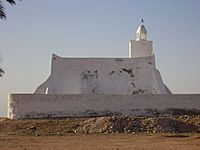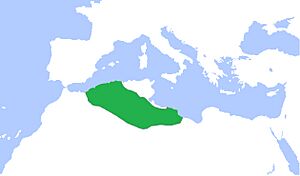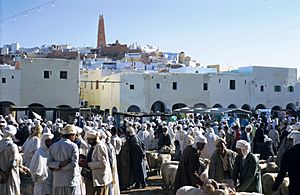Ibadi Islam facts for kids
Quick facts for kids Ibadi Islam |
|
|---|---|

The Ibadi Mosque of Guellala in Jerba, Tunisia
|
|
| Type | School of Islam |
| Classification | Kharijism |
| Theology | Monotheism |
| Founder | Abdallah ibn Ibad |
| Origin | c. 692 AD Basra, Umayyad Caliphate |
| Members | c. 2.72 million - 7 million |
The Ibadi movement or Ibadism (Arabic: الإباضية, romanized: al-ʾIbāḍiyya) is a special school of Islam. Some people call it the third main branch of Islam. The other two are Sunni Islam and Shia Islam. People who follow Ibadism are known as Ibadis.
Ibadism started about 60 years after the Islamic prophet Muhammad passed away in 632 AD. It grew from a group called the Khawarij. However, modern Ibadis do not like to be called Kharijites.
Today, Ibadism is the largest Muslim group in Oman. You can also find Ibadis in Algeria (Mzab), Tunisia (Djerba), and Libya (Nafusa). Throughout history, Ibadis have sometimes faced difficult times in the Muslim world.
Contents
History of Ibadism
How Ibadism Began
The Ibadis came from a group called the Kharijites. This group started during a big conflict in early Islam. It was after the First Fitna, a civil war in 657 CE.
The Kharijites were once supporters of Ali, a leader in Islam. But they disagreed with him when he accepted a peace talk with Mu'awiya I. After this, the Kharijites often fought against both Ali's and Mu'awiya's followers.
Around 680 CE, the Kharijites split into different groups. The Ibadi school became a more moderate group. It formed in Basra, a city in modern-day Iraq. Their ideas came from Abdallah ibn Ibad. His followers later saw him as their leader, or Imam.
The Kharijite Split
The Ibadi school's story begins after the siege of Mecca in 683 CE. Abdallah ibn Ibad was part of a group of Kharijites from Basra. They helped defend Mecca against the Umayyads.
After the siege, these Kharijites were unhappy with the Caliph in Mecca. They returned to Basra and were put in prison. Later, they were freed when Basra rebelled against Umayyad rule.
Many Kharijites then left Basra. They went to a city called Ahvaz. They were angry with the people of Basra for supporting the Caliph. But Ibn Ibad stayed in Basra. He defended the other Kharijites who also chose to stay. He said it was okay for true Muslims to live among them.
In Basra, a new group of followers started. They were led by Jābir ibn Zayd. They developed a more moderate form of Kharijite teachings. They sent people to share these ideas in places like Oman and North Africa. However, they often kept their beliefs secret to avoid trouble. This was especially true after the Umayyads took Basra back in 691.
The Ibadi State in Oman
Jābir ibn Zayd became the second Imam of the Ibadis. He helped shape Ibadi Islamic law. Unlike other Muslim leaders, Ibadi Imams were chosen by their community. They were not from a ruling family. These Imams led in religious, political, and military matters.
In 745, the first Ibadi state was created in Hadhramaut. It soon took over Yemen. But the Umayyad army fought back. They defeated the Ibadis in 748. This ended the first Ibadi state.
In 750, a second Ibadi state began in Oman. It lasted only two years before the Abbasids took over. Another Ibadi state in Oman started in 793. It survived for about 100 years. Even after Abbasid rule, Ibadi Imams still had a lot of power. Ibadi states were set up again in later centuries. Today, most people in Oman are Ibadi. The royal family of Oman is also Ibadi.
How Ibadism Spread

Ibadi ideas spread very well in North Africa. In 757, Ibadis took over Tripoli. They also captured Kairouan the next year. But an Abbasid army drove them out in 761.
After this, Ibadi leaders founded a new state in Tahart. It was called the Rustamid dynasty. This state lasted until 909. Today, Ibadi communities still live in the Nafusa Mountains in Libya, Djerba island in Tunisia, and the M'zab valley in Algeria. You can also find Ibadis in Zanzibar, East Africa. Ibadi ideas also reached other places like Persia and India, but those communities no longer exist.
By the year 900, Ibadism was present in many areas. These included Sindh, Khorosan, Hadhramaut, and Oman. By 1200, it had spread to Spain and Sicily.
Ibadi Beliefs
Ibadis believe their school of thought is very old. Some experts agree, saying Ibadism is an early and very true form of Islam.
Ibadi Leaders and Government
Unlike Sunni and Shia Muslims, Ibadi leaders (called Imams) do not need to rule the whole Muslim world. Ibadi communities can govern themselves. Ibadis do not believe their leader must be from the Quraysh tribe.
Instead, an Ibadi Imam must be the most religious person in the community. They also need to be very knowledgeable about Islamic law. They must also know how to defend the community from attacks. An Imam who knows a lot about law is called "strong." An Imam who is better at military skills is called "weak." A weak Imam must ask scholars for advice before making decisions.
Ibadis have four types of Imams for different situations:
- The Imam of Secrecy (imām al-kitmān) is a scholar who leads quietly. They keep their beliefs secret to avoid danger. This happens when the Ibadi community cannot show itself openly.
- The Imam of Exchange (imām al-shārī) is an Imam who fights against unfair rulers. They are willing to give up their life in this world for a good place in the afterlife. They must have at least 40 followers who are ready to fight.
- The Imam of Glory (imām al-zuhūr) is an active ruler of an Ibadi state. The first two caliphs, Abu Bakr and Umar, are seen as perfect examples of this type of Imam. If a ruling Imam sins, they must be removed from power.
- The Imam of Defense (imām al-difā) is chosen for a short time. They lead when the Ibadi community is under attack. They step down once the danger is gone.
Views on Other Muslim Groups
Ibadis believe that anyone who believes in one God and in Muhammad as the last prophet is part of the Muslim community. Ibadis feel it is their duty to help others understand their beliefs. Only truly righteous Ibadis are called "Muslims." Other Muslims are called "people of opposition."
However, Ibadis still respect other Muslims. They see them as part of the larger Islamic community. Ibadis can even marry non-Ibadi Muslims. Ibadis believe that all non-Ibadi Muslims and even Ibadi sinners are guilty of kufr (unbelief). But they separate religious disbelief from sinning.
Traditionally, Ibadi scholars believed that only righteous Ibadis would go to heaven. They thought that all sinning Ibadis and all non-Ibadis would stay in hell forever. They do not believe that Muslims in hell will eventually go to heaven.
Ibadis have ideas of "friendship" (walayah) and "disassociation" (bara'a). They believe they should only be close friends with righteous Ibadis. Sinners and non-Ibadi Muslims are subject to disassociation. This sometimes means keeping a distance. Modern scholars say this does not mean being rude. It means having an inner feeling of separation. In reality, Ibadis are often very accepting of other religions.
Ibadi Theology
Ibadi beliefs were shaped by many scholars and Imams. The city of Basra was very important for the Ibadi community. Ibadi communities also grew in Oman, North Africa, and East Africa.
Ibadi beliefs are similar to another group called the Muʿtazila. But they differ on the idea of predestination. Like the Muʿtazila, Ibadis believe:
- Humans can know God through reason. They do not need to be taught. If a Quran verse seems to go against reason, it should be understood in a symbolic way.
- God's qualities are part of His single being. Mercy, power, and wisdom are just different ways to describe God. They are not separate qualities.
- Some Ibadis believe the Quran was created by God at a certain time. They see it as a sign of God's being. This is different from Sunnis who believe the Quran has always existed.
- Ibadis understand descriptions of God having physical parts (like hands or a face) as symbolic. God cannot be seen by human senses. They believe Muslims will not see God on the Day of Judgment.
However, Ibadis also follow the Ash'ari idea of occasionalism. This means they believe God directly causes all events. For example, fire produces smoke only because God chooses to create fire, and then to create smoke.
Ibadi Law and Practice
Ibadi law is based on similar ideas as Sunni and Shia law. But Ibadis do not just follow old teachings. They believe it is important to use independent reasoning (ijtihad).
Ibadis believe that certain punishments are put on hold when their community is hidden. This is like Muhammad's life in Mecca before he moved to Medina. During this time, there was no independent Muslim community to enforce laws. So, some punishments are suspended, except for very serious crimes like murder. Ibadis also do not hold Friday prayers unless there is a proper ruling Imam.
During the Ramadan fast, Ibadis believe you must perform a full-body wash (ghusl) before the fast begins if needed. Otherwise, the fast is not valid. They also believe that serious sins break the fast. If you miss fasting days, Ibadis believe you must make them up one after another.
In prayer (Salah), Ibadis keep their arms at their sides. This is different from most Sunnis. During noon and afternoon prayers, Ibadis only recite the first chapter of the Quran, called al-Fātiḥah. They also do not say "Amen" after reciting al-Fātiḥah. Ibadis shorten their prayers when they are in a foreign country, even if they live there permanently.
Ibadi Hadith
The main collection of Ibadi hadiths (sayings of Prophet Muhammad) is called Tartib al-Musnad. It was put together in the 12th century. It has 1,005 hadiths. Most of these hadiths are also found in Sunni collections. Modern Ibadis often accept the standard Sunni hadith collections.
Unlike in Sunni and Shia Islam, the study of hadiths has not been as important in Ibadi Islam.
Mysticism and Sufism
Ibadis do not have Sufi orders. They also do not worship saints. Historically, Ibadi writings did not think highly of Sufi ideas.
However, some Ibadi scholars practiced spiritual methods similar to Sufism. Miracles were sometimes said to happen through them. Modern Ibadis have different views on these practices. Some think they are not part of true Ibadi faith. Others continue to practice them.
Views on Early Islamic History
Ibadis agree with Sunnis that Abu Bakr and Umar ibn al-Khattab were good leaders. They believe the first half of Uthman ibn Affan's rule was good, but the second half was not. They approve of the first part of Ali's leadership. Like Shias, they do not approve of Aisha's rebellion or Muawiyah I's revolt.
However, Ibadis believe Ali became unfit to lead when he accepted peace talks. They also criticize him for fighting the Kharijites at the Battle of Nahrawan. Modern Ibadi thinkers defend the early Kharijites who opposed Uthman, Ali, and Muawiyah.
Ibadis believe the next true leader after Ali was Abdullah ibn Wahb al-Rasibi. He was a Kharijite leader who turned against Ali. Ibadis believe their faith came from people like him.
Wahbi School of Thought
The Wahbi school is the most common and main branch of Ibadism. Most of the old Ibadi writings that we still have today come from Wahbi scholars.
Wahbi Terminology
The name "Wahbi" comes from the teachings of Abd Allah ibn Wahb al-Rasibi. At first, this term was not really needed because Ibadism was very united. But later, when other groups split off, "Wahbi" was used to tell them apart. Wahbi Ibadi leaders often told their followers to call themselves ahl al-istiqama. This means "those on the straight path."
Where Ibadis Live
Oman has the most Ibadis. In Oman, Ibadis and Sunnis make up about equal numbers of Muslims (45% each). Shias are about 5%. There are about 2.72 million Ibadis worldwide. About 250,000 of them live outside Oman.
In the past, the Rustamid dynasty in Algeria was Ibadi. People who fled from its capital, Tiaret, started the Ibadi communities in North Africa. These communities still exist in M'zab. The Mozabites, a Berber group in the M'zab valley, are Ibadis. Ibadism is also found in Zanzibar (Tanzania) and the Nafusa Mountains (Libya). They are also a smaller group in cities like Ouargla and on the island of Djerba.
The main branch of Ibadism is Wahbi. Other notable modern branches include Nukkar and Azzabas.
Famous Ibadis
Important People
- Sulaiman al-Barouni: A leader in Tripolitania.
- Ahmed bin Hamad al-Khalili: The current top religious leader (Grand Mufti) of Oman.
- Qaboos bin Said al Said: The former Sultan of Oman.
- Nūr al-Dīn al-Sālimī: A scholar who lived from about 1869 to 1914.
- Jamshid bin Abdullah of Zanzibar: The last Sultan of Zanzibar.
- Nouri Abusahmain: A former head of state in Libya.
- Moufdi Zakaria: A poet and writer who wrote Algeria's national anthem.
- Ghalib Alhinai: The last elected Imam of Oman.
- 'Abd Allah ibn Wahb al-Rasibi: An early leader of the Kharijites.
- Abd-Allah ibn Ibadh: A jurist and one of the founding figures of Ibadism.
- Jābir ibn Zayd: A Muslim theologian and key founder of Ibadism.
- Abu Yazid: A Berber leader who led a rebellion against the Fatimid Caliphate.
- Hunaina al-Mughairy: The ambassador of Oman to the United States since 2005.
- Haitham bin Tariq: The current Sultan of Oman.
Ibadi Ruling Families
- Rustamid dynasty: Ruled from 776 to 909.
- Nabhani dynasty: Ruled from 1154 to 1624.
- Yaruba dynasty: Ruled from 1624 to 1742.
- List of Sultans of Zanzibar: Ruled from 1856 to 1964.
- Al Said: The current ruling family of Oman, from 1744 to today.
See also
 In Spanish: Ibadíes para niños
In Spanish: Ibadíes para niños
- Outline of Islam
- Glossary of Islam
- Index of Islam-related articles
- Ghardaïa
- Islam in Oman
- Sultanate of Zanzibar
 | John T. Biggers |
 | Thomas Blackshear |
 | Mark Bradford |
 | Beverly Buchanan |


